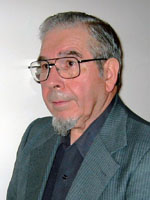
James R. Florini
Syracuse University
Rewarding Moments
I still have strong memories of my first Gordon Conference in 1963 at Kimball Union Academy. It was wonderful to talk one-on-one with leading scientists in my field. At the time I had no idea that the Gordon Conferences would play such a large role in my life and provide some of my most rewarding moments. I am particularly pleased at the continuing success of the Hormone Action GRC, which I started in 1969; I am nearly as proud of it as I am of my two daughters. I also facilitated the foundation of the Peptide Growth Factors and the Myogenesis Gordon Conferences.
One of the best features of Gordon Conferences is access to its great speakers. At a Peptide Growth Factor Conference in the mid-1980s, Nobel laureate Stanley Cohen (a towering fixture in the growth factor field, having been the first reporter of nearly every major growth factor discovery) gave the keynote Sunday-night lecture. At breakfast Monday morning I happened to be sitting at the table with Stan and several other people when a young woman sat down with us. After some hesitation she joined in the conversation, asking Stan a few questions about his talk. As is his very gracious habit, he answered her fully and frankly. A bit later, when we were leaving the dining room, she turned aside to me and said, “I never dreamed that I could ask Stanley Cohen why he did an experiment!” It turned out that she was a brand-new postdoc attending her first scientific meeting. To me, that is the essence of a Gordon Conference–a new postdoc asking a Nobel laureate about his experimental choices.
Just as important, Gordon Conferences make possible the transfer of critical scientific advice through informal communication. In the summer of 1980
Time magazine sent a reporter to New London, New Hampshire, to do a feature. For whatever reason Alex Cruickshank sent her to nearby Andover, where I was chairing the Biology of Aging GRC, and I happened to have a story that illustrated the importance of informal communication at Gordon Conferences. At the same conference two years earlier Ed Masero of the University of Texas, San Antonio, asked me during a morning coffee break what I was planning to do next. I outlined projected experiments on the effects of age on amino acid transport into isolated diaphragm muscle (which is one way to measure protein anabolic responses). Ed, an experienced physiologist, pointed out that this approach, while fine for the thin muscle in young rats, would not be appropriate for the much thicker muscles of the twenty-four- to twenty-eight-month-old animals used in studies of the effects of aging. In these muscles the interior of the diaphragm becomes anoxic and releases many degradation products, completely invalidating any resulting measurements. As I told the
Time reporter, who quoted me in the article, that information probably saved us a year of wasted work, and the situation illustrated what a Gordon Conference can make possible.
Gordon Conferences also reap incredible personal rewards. In 1981 I was elected to the Selection and Scheduling (S&S) Committee, although at the time I knew little about its duties or even its existence. For various reasons I attended every fall S&S meeting from 1981 to 1999, as well as nine board of trustees meetings. At a wonderful surprise ceremony at the 1999 S&S meeting I said, “When I went to my first S&S meeting in 1981, I had very little idea of what I was to do, and I certainly didn’t think I would be doing it for the rest of the century.” At that event I was given a beautiful Tiffany crystal bowl inscribed “Professor James R. Florini; 18 Years at the Frontiers of Science–Gordon Research Conferences.” Those eighteen years included some of the most enjoyable interactions I have ever had. It was wonderful to work with such able, accomplished, distinguished, and delightful people on what we all considered the best scientific meetings in the world.